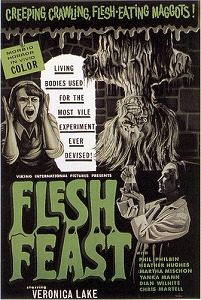When Is Horror Too Much?
 Here at Spec Faith we have, from time to time, had a writer give an apologetic for the horror genre of fiction. I’m thinking of articles by Brian Godowa (a series existing of Parts 1, 2, and 3), Mike Duran (such as this article, this one, and this), R.L Copple (in this, this, and this article), and more recently, Mark Carver. Even I, who do not read horror, have conceded that the genre has its purposes and can lead readers (and writers, alike) into truth.
Here at Spec Faith we have, from time to time, had a writer give an apologetic for the horror genre of fiction. I’m thinking of articles by Brian Godowa (a series existing of Parts 1, 2, and 3), Mike Duran (such as this article, this one, and this), R.L Copple (in this, this, and this article), and more recently, Mark Carver. Even I, who do not read horror, have conceded that the genre has its purposes and can lead readers (and writers, alike) into truth.
However, as October rolls on and as more movies of the horror kind appear in ads, I’ve begun to wonder if there isn’t a limit. And if so, what might that limit be?
First, I’m mindful that believers of old did not shy away from horror. Hardly! Some of our most loved hymns are based on a premise of what we today consider to be horror. Take “A Mighty Fortress Is Our God” for instance. A close look at the lyrics, especially at the third stanza, shows the very conscious understanding of horror that Martin Luther had:
A mighty fortress is our God, a bulwark never failing;
Our helper He, amid the flood of mortal ills prevailing:
For still our ancient foe doth seek to work us woe;
His craft and pow’r are great, and, armed with cruel hate,
On earth is not his equal.Did we in our own strength confide, our striving would be losing,
Were not the right Man on our side, the Man of God’s own choosing:
Dost ask who that may be? Christ Jesus, it is He;
Lord Sabaoth, His Name, from age to age the same,
And He must win the battle.And though this world, with devils filled, should threaten to undo us,
We will not fear, for God hath willed His truth to triumph through us;
The Prince of Darkness grim, we tremble not for him;
His rage we can endure, for lo, his doom is sure,
One little word shall fell him.That word above all earthly pow’rs, no thanks to them, abideth;
The Spirit and the gifts are ours through Him Who with us sideth;
Let goods and kindred go, this mortal life also;
The body they may kill: God’s truth abideth still,
His kingdom is forever.
Think about those words for a moment. We have an enemy whose craft and power is great, who is armed with cruel hate and who doesn’t have a match here on earth. Furthermore, the world is filled with devils which threaten to take us apart. The Prince of Darkness is behind it all, and he or his forces may be behind the death of the believer.
All that seems to fit into the horror genre, if you ask me. But it’s also Biblical. Nothing that Martin Luther wrote in this hymn is not an echo of the Bible. But Luther wasn’t alone. Other writers of old painted the picture of believers facing spiritual forces.
It seems to me that only in contemporary times are the songs so many churches sing void of this element of conflict with forces of evil. Or maybe I’m not aware of the ones that do so. The ones I’m familiar with are more about the love God give, praise for Him because of His grace and compassion and gift of redemption.
Those songs are also Biblical, but I don’t see a depiction of the horror from which we are saved. There’s no “I once was lost . . . was blind.” Instead songs are more apt to say we are loved, that’s who we are. Not lost, not blind. In other words, much of the horror of life has been stripped away.
 Stories in the horror genre replace what much of the contemporary song writers are ignoring.
Stories in the horror genre replace what much of the contemporary song writers are ignoring.
But how much is too much?
Some of those movies I mentioned that are being advertised on TV this month seem beyond healthy. On the heels of a man shooting an automatic weapon into a crowd of anonymous strangers, I can’t help but wonder if we aren’t creating this kind of monstrous behavior by giving the public so much evil to dwell on.
On the other hand, I also wonder if we don’t now respond to horror with a shrug and a sigh, After all, we’ve turned the classic horror scenario into a comedic ad. We’ve seen the possession movies and the vampire flicks. We’ve experience the adrenaline rush of fear as another monster jumps out from behind the screen. Now we expect what once was unexpected, and we need something more to produce the desired effect.
In the meantime, what had seemed horrific now seems rather common place. We are no longer moved by the zombie apocalypse. Are hearts have become a bit harder to what once used to terrify.
Is that good?
 I don’t think so. Rather, I believe this sort of ho-hum attitude to the horrors of life—either on the spiritual plain or the physical—is a symptom of what Scripture refers to as a hard heart. We are no longer moved by that which should trouble us, by that which should caution us. We simply want the emotional rush, at all costs, and no longer bother to deal with the psychological factors, let alone the spiritual repercussions.
I don’t think so. Rather, I believe this sort of ho-hum attitude to the horrors of life—either on the spiritual plain or the physical—is a symptom of what Scripture refers to as a hard heart. We are no longer moved by that which should trouble us, by that which should caution us. We simply want the emotional rush, at all costs, and no longer bother to deal with the psychological factors, let alone the spiritual repercussions.
So how much horror is too much? Is that an individual thing, a societal concern, something for the church to address?
Surely, creating some kind of taboo is not the answer. I think of harvest festivals replacing Halloween parties, and wonder what we’ve accomplished. In short, isn’t the absence of horror in the church part of the problem, and the appetite for it the other part of the problem?






























Such a good article! Completely agree.
Yeah, there should be a limit, I can’t watch much of the horror these days without wanting to roll my eyes and go find something else more interesting to watch (namely Alfred Hitchcock or a good mystery). But then again, I don’t have an appetite for it, so, that might be the other reason (but I do enjoy a good mystery).